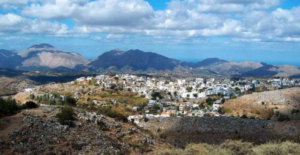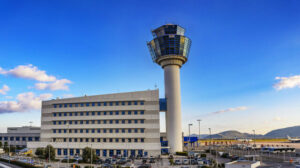The World Tourism Organization of the UN World Tourism Organization (UNWTO) has included Anogia in the 55 Best Villages of the World for 2024, awarding it as an Outstanding Destination in the field of Rural Tourism, giving them credit for everything that the village and the Municipal Authority have committed to in terms of innovation and sustainability in the broad field of society, economy and environment.
As the Mayor of Anogei and President of the Committee of Mountainous Areas of Greece, Socrates Kefalogiannis, said, “The award is for a global initiative through which the Villages where tourism does not become a hindrance to their cultures, their traditions, while investing in sustainable development by providing opportunities and protecting biodiversity are highlighted. Through the specific recognition that accompanies the award, the World Tourism Organization is making known to the international tourism market the Rural Communities, including Anogia, which are shaping and evolving the future of sustainable travel.”
From Caviahue-Copahue in Argentina to Tra Que Vegetable Village in Vietnam, 55 are the Best Tourism Villages that have demonstrated that, by protecting their identity, they protect their identity based on the characteristics and criteria as set by the UN World Tourism Organization, with sustainable development, connecting local communities with soft tourism and promoting environmental protection as the overriding principles.
More than 260 nominations from more than 60 UN member states were put under the microscope of the experts, whose judgement highlighted Anogia, Crete, among the 55 villages, as a tourist destination that meets the requirements for the future of tourism in small communities. “The ‘Best Tourism Villages’ initiative, which is part of the United Nations’ Tourism Development Programme for Rural Development, not only recognizes the remarkable achievements of these villages, such as Anogia, but also highlights the power of tourism and how it can influence the healthy development of areas such as small villages,” noted Anogia Mayor Socrates Kefalogiannis.
The villages were assessed in nine key areas, namely: “Cultural and natural resources / promotion and preservation of cultural resources / economic sustainability / social sustainability / environmental sustainability / tourism development and value chain integration / governance and prioritization of tourism / infrastructure and connectivity / health and safety.” UN Secretary General of Tourism, Zurab Pololikashvili, referred to tourism as an essential tool for inclusion, empowering, he said, rural communities to protect and appreciate their rich cultural heritage, while leading to sustainable development.
Anogia is now part of the family of 254 villages that form part of the largest community of rural destinations in the world. The “Best Tourism Villages” initiative also highlights the fact that small local villages and communities are valorized according to all that they can promote and relate to economic development, local traditions and improving the quality of life of their inhabitants. The Mayor of Anogia also argued that: “Anogia was awarded because, without hurting its history, its people’s community and always with an eye on future generations, it embraced tourism as one of the ways that benefit community empowerment and prosperity, demonstrating that sustainable practices can lead to a better future for all, especially in rural areas where landscapes, cultural diversity, local values and culinary traditions have not been discounted.” The entire UN effort through both the Best Tourism Villages programme and the Best Tourism Villages Network maintains another objective, which has to do with combating desertification. By awarding and recognising Anogia, in the future through the Network, there is the opportunity to participate in a space of exchange of experiences and good practices, lessons and opportunities. Among the members of the Network there is an open channel of communication with experts and partners from the public and private sectors, who contribute to the promotion of tourism as a driver of rural development.
The 55 “UN Tourism 2024 Best Tourism Villages” are (in alphabetical order):
Abo Noghta Castles and Historic Tabab (Saudi Arabia)
Abu Ghosoun (Egypt)
Aínsa (Spain)
Amagi (Japan)
Anogia (Greece)
Azheke (China)
Bo Suak (Thailand)
Capulálpam de Méndez (Mexico)
Caviahue-Copahue (Argentina)
Cuatro Ciénegas de Carranza (Mexico)
El Tambo (Ecuador)
Anton Valley (Panama)
Esfahak (Islamic Republic of Iran)
Gaiman (Argentina)
Gharb Suhayl (Egypt)
Grand Baie (Mauritius)
Guanyang (China)
Huancaya (Peru)
Garden (Colombia)
Jatiluwih (Indonesia)
Kalopanagiotis (Cyprus)
Leymebamba (Peru)
Mindo (Ecuador)
Mura (Spain)
Nishikawa (Japan)
Óbidos (Portugal)
Ormana (Turkey)
Palizada (Mexico)
Pissouri (Cyprus)
Portobello (Panama)
City of Maras (Peru)
Quinoa (Peru)
Ralco (Chile)
Roches Noires (Mauritius)
Romoos (Switzerland)
Ruboni (Uganda)
San Casciano dei Bagni (Italy)
San Juan del Obispo (Guatemala)
San Rafael de la Laguna (Ecuador)
Santa Cruz da Graciosa (Portugal)
Shibadong (China)
Sibayo (Peru)
Splügen (Switzerland)
St. John in Tyrol (Austria)
Taoping (China)
Tra Que Vegetable Village (Vietnam)
Trevelin (Argentina)
Uaxactún (Guatemala)
Urych (Ukraine)
Villa Tulumba (Argentina)
Vorokhta (Ukraine)
Wukirsari (Indonesia)
Xiaogang (China)
Xitou (China)
Yandunjiao (China)
Also 20 villages were selected to participate in the “Upgrading Program” this year and these are:
Breb (Romania)
Campo Ramón (Argentina)
Cap Malheureux (Mauritius)
Cascas (Peru)
Choshuenco (Chile)
Dudmaras (India)
Lens (Switzerland)
Malalcahuello (Chile)
Mexcaltitán de Uribe (Mexico)
Mittelberg (Austria)
Pals (Spain)
South Piedades (Costa Rica)
Polovragi (Romania)
San Juan Bautista (Chile)
Santa Catarina Palopó (Guatemala)
Seonhakdong (Republic of Korea)
Shirayama (Japan)
St. Leonhard in Pitztal (Austria)
Yamakoshi (Japan)
Yörük (Türkiye)
The call for evaluation dossiers for the fifth edition of the Network will take place in early 2025, providing a new opportunity for rural destinations to share their inspiring initiatives and gain global recognition as champions of rural development. The Mayor of Anogia, Socrates Kefalogiannis, thanks the municipality’s executives and the team that worked systematically to prepare a solid nomination dossier and support it.
Ask me anything
Explore related questions





